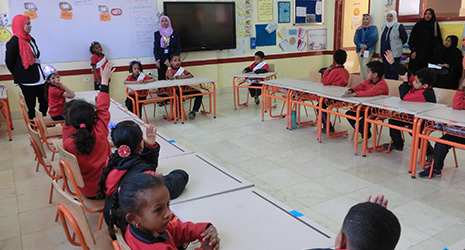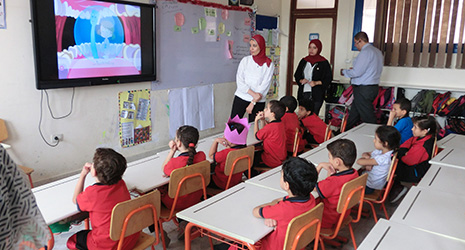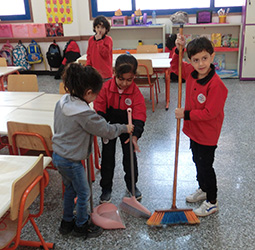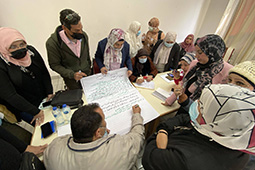December 2022
- PREVIOUS
- NEXT
Popularizing Tokkatsu in the Egyptian Classroom

A classroom discussion at an Egyptian-Japan School (EJS) 
A class at an Egyptian-Japan School (EJS)

Children cleaning at an Egyptian-Japan School (EJS) 
Tokkatsu training for teachers

The Japan International Cooperation Agency (JICA) is supporting educational reforms in Egypt through the spread of Japanese-style education focused on special activities, commonly referred to as tokkatsu.

In Japanese schools, educational activities known as special activities (tokubetsu katsudo, or tokkatsu for short) are conducted aiming to enrich and improve class and school life and to develop students’ attributes and their ability to solve life problems as members of an organization and society through class activities and school events. For example, there are classroom discussions where students and teachers converse and solve class problems on their own, daily class coordinators where a different student is in charge of cleaning the blackboard after class each day, and school lunch duty, where students serve food and clean up afterwards. Tokkatsu extend to a variety of scenes of student life, including classroom and schoolyard cleaning, school events such as sports events where students compete in a variety of competitions, and more. In Japanese school education, these are some of the important educational activities meant to develop students’ initiative and ability to cooperate.
Egypt has had its eye on these tokkatsu in Japan. Egyptian schools are facing the challenge of not adequately performing the role of developing social skills, such as cooperation and discipline, due to a variety of factors, including overcrowded classes from an increase in number of students and an overemphasis on memorization and testing in class. As a way of responding to these challenges, the Egyptian government decided to introduce Japanese tokkatsu into their school education.
“Egyptian President Abdel-Fattah El-Sisi, who observed an elementary school in Tokyo in 2016, was apparently very impressed with seeing students cooperate and serve lunch to one another,” says Matsuzaki Mizuki, a director of the Basic Education Team of the Human Development Department at JICA Headquarters. “Japanese school education is geared not just to helping children gain knowledge, but also to developing their humanity and social skills. I think this is what the Egyptian government rated so highly.”

Accepting a request from the Egyptian government, JICA began cooperating with the Egyptian Ministry of Education and Technical Education (MOETE) in 2017 and launched a project to introduce Japanese-style education in Egypt centered around tokkatsu. One major pillar of the project is the opening and operational support of the Egyptian-Japan Schools (EJS). At these schools, there is a maximum of 36 students per class, which is small compared to the average of 55 students in Egyptian public elementary schools. EJS also feature more classroom floor space than ordinary elementary schools in Egypt. They also have one desk and chair for each student, as opposed to long desks and chairs shared by multiple students as seen at other elementary schools. Additionally, EJS have been conducting school events, such as sports events, classroom discussions, classroom instruction*, daily class coordinators, and other class activities, as an Egyptian version of the tokkatsu model, and together with the project, they aim to spread this model to many schools in Egypt.
In 2018, 35 EJS were opened, attended by first- and second-year kindergarten students and first-year elementary school students. As of October 2022, this has grown to 51 schools up to elementary grade 5, and around 10,000 children are attending these schools. EJS are very popular, and the average admission ratio to enter the schools last year was about one in five.
“In a survey of teachers and guardians, we found that EJS elementary school students had demonstrated more positive changes in patience, communication skills, problem solving skills, and other non-cognitive skills** than students at ordinary schools,” says Nakajima Motoe, who has been dispatched to Egypt as a JICA expert from 2019. “For example, we’ve heard that there have been improvements in teamwork among students and a sense of unity as a school across grades through group competitions held at EJS sports events. I think it can be said that these are also a result of tokkatsu.”
In 2018, the curriculum for first year elementary school students was revised for all of Egypt, and it was decided to introduce classroom discussion, daily class coordinators, classroom instruction, and other tokkatsu at Egypt’s approximately 18,000 elementary schools. At the same time, the JICA project began putting effort into Tokkatsu Officer training to establish tokkatsu across all of Egypt. A Tokkatsu Officer is an instructor who teaches elementary school teachers, principals, and other educators about the basic principles and instruction methods for tokkatsu. JICA holds training seminars in Japan and Egypt, inviting Japanese tokkatsu experts as lecturers, and they have supported the training of about 100 Tokkatsu Officers so far.
These Tokkatsu Officers were to the fore in the large-scale tokkatsu training seminars held by MOETE from June to September of this year (2022). Participants included about 30,000 educators, including teachers and principals from all over Egypt. The Tokkatsu Officers acted as instructors and held two-day training sessions repeatedly at venues across the country.

“I got the sense that tokkatsu will spread even further through Egyptian efforts when I saw the Tokkatsu Officers confidently speak about the special activities in front of many participants. There were also many comments from participants about how very useful the training was as it was practical,” says Nakajima. “I hope to offer support to Egyptians as they create and establish their own style of tokkatsu in the future.”
- * The goal of classroom instruction is for students to learn about important things for life, such as developing fundamental life skills including washing hands and brushing teeth and forming better relationships which includes compassion towards friends, and to acquire the ability to take action.
- ** Non-cognitive skills are abilities that are difficult to quantify using tests, and include cooperation, patience, and creativity.
- PREVIOUS
- NEXT

